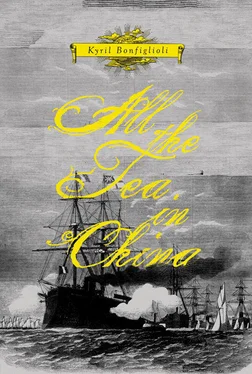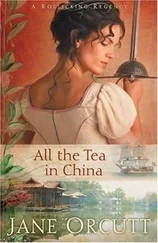All the Factories were curiously dignified in a variety of European styles yet all bearing an indefinable Oriental flavour. The English Factory was enormous: forty yards wide and one hundred and forty yards deep, a maze of courtyards, treasuries, state reception rooms and even a church. It was as self-contained as a monastery.
Each of the common crewmen was now issued a small advance of pay: enough to buy a few trinkets and to become drunk for just less than the length of time we were to remain there. They were strictly enjoined to stay in parties of not less than five, each party to include, and be governed by, a senior rating who was familiar with the perils of the place. The boatswain “Tommy Pipes” was to make these arrangements. Finally, the Captain vowed that he would severely fine any man who allowed himself to be murdered. To this day I am not certain whether he meant this as a joke, for he was a humourless man.
Then, before he entered the factory proper, to pay his formal calls, he turned to me and thrust a slip of paper into my hand.
“Proceeds of your share, Mr Van Cleef,” he growled. It was a brand-new draft on a Parsee bank.
I puzzled at the amount, for it represented a price of no less than £215 per chest — the price for the highest quality we had sold at Namoa. I opened my mouth to point out his error but he silenced me with a gesture.
“I sold all yours at Namoa, Mr Van Cleef. Lay it out carefully on your cups and saucers and fiddle-faddles. They’ll not rob you but you’ll not get the choicest wares unless you put on a little arrogance. That’s a word to the wise, young Lewis.”
I believe I have already suggested the reason why he had once before given me that name. He was, I suppose, not really a bad man, only sad and mad; this is like having a broken leg inside your brain — no splints can be applied and, since there are no physical signs, you get no sympathy nor any kindly nurses.
Dismissed, Peter and I joined forces and he offered to be my cicerone. I checked him.
“First,” I said, “we eat.”
“Well now,” he began, “there are numerous …”
“No,” I said. “Be guided by me.” He gaped, then grinned sardonically and thrust his hands into his trowsers-pockets.
“Very well, Karli. Lead on, I am in your hands.”
Taking a mental bearing on the flagstaff which I had seen over the wall, I soon found the entrance to the Dutch Factory and we sauntered into the great counting-house, where a dozen pairs of eyes, and as many eyebrows, rose from desks and ledgers to meet us. I studied these people rapidly and selected a youngish man who seemed to be of middle rank and, although his eyes were blue and his hair yellow, was clearly of my own race. Introducing myself courteously, I gave him some vague story of a long-lost uncle who had last been heard of on the China Coast. It was wonderfully pleasant to speak — and to hear again — the good Dutch tongue and he seemed no less pleased to converse with someone fresh from home. Soon everyone in the room was gathered around the desk, gossiping freely. A gong sounded for dinner and we were carried in to a veritable feast, a wonderful blend of Dutch and Chinese food — and great store of it. Peter, at first a little huffed, soon succumbed, for his nature was generous, and winked at me across the mounds of rijsstaffel. Afterwards, for I had been at pains to make myself agreeable, a splendid bedroom was pressed upon us — the place at that time of the year was half empty — and I changed my draft for several smaller drafts and a little gold and silver for pocket money. It was arranged that a Chinese dealer in fine porcelains would be summoned to wait upon me that evening with his wares and that I should pay one half of one per centum on any transaction in exchange for the services of their interpreter.
“Now,” I said, linking arms with Peter as we emerged into the sunlight and stink, “I have exhausted my little skills, please take command and let me follow.”
“Do you mind if I call you a bastard, Karli?”
“Not in the least,” I replied smugly, “for I know that it is not literally true and that you would not say it if you thought so.” He roared with laughter, for he was as full of food and wine and schnapps as I was.
“You are a pompous bastard, then, Karli, a crafty bastard and, I suspect, a lucky bastard. Also, you are drunk.”
“Not yet, but the suggestion is a good one. Where shall we go?”
First we went a-sightseeing the length of Thirteen Factories Street, past the English, Parsee, “Old” English, Swedish, Imperial and Paou Shun Factories until we came to the corner of Old China Street, where the American Factory and the Hong warehouses faced each other. To the right, Peter pointed out an elegant building which was the Consoo Hall, which was a sort of Council Chamber for the Hong and the office of their mutual-assistance-against-bankruptcy fund. (True to the quirkiness of Chinese humour, this was funded not by brotherly co-operation amongst themselves but by an arbitrary ad valorem charge of four or five per centum on all Western goods passing customs, so that the “Western Ocean Barbarians” were, willy-nilly, protecting the Hong merchants against their own rashness in business (God save the mark!) to the tune of some third of a million sterling each year. Although I have no Chinese blood, I could relish the irony of this.)
Strolling a little further, so as to see the fine French Factory, we turned down New China Street between the Spanish and Danish Factories, which flew no flags because they were no longer staffed by Spaniards and Danes, but let out as offices and bedrooms to all sorts of minor commerce-venturers. At the end of this street we entered a sort of square called Respondentia Walk or, after the nearest feature of the river-bank, Jackass Point. This was an alarming place, thronged with pimps and pedlars, whore-masters and hucksters, beggars, loafers, cripples, madmen; drunken sailors from our own ship and a knot of a Chinese policemen who were laying about them with seven-foot staves in their twice-daily pretence of clearing this promenade of undesirables. We made haste to turn left into the thoroughfare between the English and Parsee Factories: this was called by a string of crack-jaw Chinese syllables which meant “Green Pea Street” but was known to all English-speakers as “Hog Lane”.
It was indeed a hoggish place, devoted to drunkenness, the selling of caged birds, threatening demands by able-bodied beggars, the telling of fortunes by professional liars, carneying pleadings by shifty fellows who had failed to pass the examination for mandarin because of enemies in high places, pimps, ponces, perverts and minor civil servants with secrets to sell. Had the street been broader and the faces white, one would have thought oneself to be in Fleet Street.
We shouldered our way to Ben Backstay’s establishment, a gin-shop where Peter was remembered and greeted rapturously. Enough drunken people were kicked and thrown into the street to make a table clear for us. Delicate little dishes of shrimp and duck-skin appeared as if by magic and, as we munched, Peter ordered a bottle of gin, a loaf of sugar, a lemon, and a pot of hot water. This was not to my taste and I signified to the proprietor that I would have what the happily-drunk fellows at the next table were enjoying. This came in a bottle shaped like an Indian club and proved to be “First Chop Rum Number One Curio”, which promised well. Peter shook his head gravely.
“Better stick to gin, Karli, I promise you. That is not only a violent intoxicant but a most inflammatory genital vesicant. In other words, it will not only make you fearfully drunk but also desperately lustful.”
It certainly commenced to make me drunk but as to the other property I cannot honestly vouch because, to speak plainly, I was in those days desperately lustful all the time. I should be most interested to try that drink again, now that I am a little less full of sap.
Читать дальше












